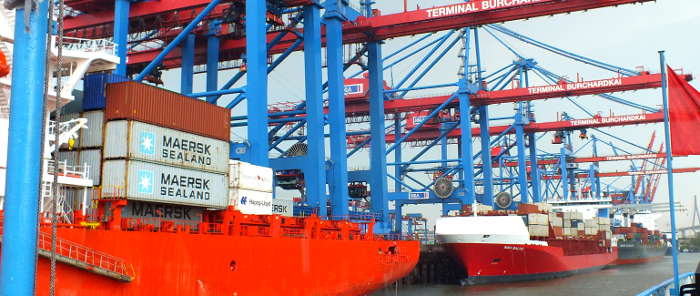
GLOBALIZATION? What globalization?
Like it or not, globalization is here to stay. The question is not "Should it continue?" but "How can it work for everyone?"
USA / world - Society
by Andrew RossiterWords/phrases in red are explained in the general word guide below: words in blue are explained in the specific economic word guide.
Donald Trump is determined to Make America Great Again, and part of his plan is to reduce the USA's dependence on imports. But as his introduction of tarifs on imports from many other countries, and particularly from China, has shown, import tarifs are driving up American consumer prices, making many essential products more expensive for ordinary Americans. Globalization has hugely benefited people in developed countries, and other countries too, by keeping down the cost of living. And whatever Donald Trump may want to do, it's here to stay, in one form or another.
Mention the word "globalization", and you are likely to get a reaction.
Globalization, the creation of a new world economic system dominated by huge corporations and the "G7" nations, is an idea that has its fervent supporters and its bitter opponents.
For its opponents, globalization is seen as a system designed to impose the American economic model on the whole world, for the sole benefit of the USA and a few other rich countries. For its supporters, globalization is the way forward to a better world, where everyone will ultimately be better off than they are today.
Globalization is a process about which both supporters and opponents can justify some of their arguments. Yet in spite of the hopes of many of its critics, there is one thing about which there can no longer be any doubt. "Globalization" is not a future development that we can accept or reject; it is a process that has already largely taken place; and it is one from which - in all but the most catastrophic future scenarios - there can be no going back
A few years ago in Paris, I attended an international symposium on globalization that brought together politicians and economists, diplomats, academics, trade unionists and representatives of humanitarian agencies; there were speakers from Africa, Asia, Europe and the Americas, including Umberto Eco, former French foreign minister Bernard Kouchner, and Harvard economist Jeffrey Sachs. Each had his or her own specific views, but there was one thing on which every speaker agreed; the fact that globalization is here to stay.
As French trade union leader Nicole Notat put it, "The market economy is certainly the best system that exists."
Historic roots
In many ways, there is nothing
new about globalization; it is a process that began to spread some
three
hundred years ago, when European nations, and Britain in particular,
developed
an economic system that depended on international trade.
Spices,
sugar, tea and coffee were among
the first commodities that
were traded
globally. By 1850, Britain - the most developed nation at the time -
had
an economy that was dependent for its survival on global trade. Unable
to feed
its growing population, the country
was importing 25% of its basic food, most of it from America and the
British
empire; and even if Britain was at the time far ahead of other nations
in the "globalization" of its economy, other countries such as France
and
the United States were already moving strongly in the same direction.
Without the
globalization of trade, no nation would have been able to achieve
its current state of development; for no nation in the world, not even
the USA, can supply all
its own needs in raw
materials, products,
or services.
Over the last
two centuries, thanks to this process, living standards have increased
dramatically in most parts of the world. Yet this huge improvement has
not benefited every nation equally, and there are indeed some parts of
the world where living standards have actually
declined. In 1820, the difference in wealth
between the people in the world's poorest nations and those in the
world's
richest nations was about 3 to 1. Today it is about 30:1.
It is this flagrant
inequality resulting from globalization, that is unacceptable to so
many
people.
Nonetheless,
it would be quite wrong to suggest that globalization only benefits the
nations of the world that are already rich. In the last fifty
years, a
whole group of nations, including China and India, the world's two most
populated states, have benefited massively from the advantages of
globalization. Not to mention oil-rich states like the Emirates or
Dubai. In the 1990's, eighteen out of twenty of the fastest
growing economies in the world were in the developing world; only two
were "western" countries. In the 1990s the Chinese economy, thanks to a
huge development
of international trade, grew by a massive average of 10.7% per year,
bringing
jobs and a sharp rise in living standards
to millions of people. Without globalization, where would they be?
By contrast,
over the same period the economy of Switzerland, one of the world's
richest
nations, grew by just 0.6% per year.
The way forward
In the end therefore, the question
is not "To globalize or not to globalize?" It is a matter of finding
ways
to make sure that the riches of tomorrow's global economy are spread
more
equitably
across the world.
It is not going
to be easy. For instance there is a large degree of popular consensus
in developed countries that the "Third World Debt", the vicious
circle of poverty that condemns some of the world's poorest countries
to
remain poor, is an injustice that must be set
right;
yet even though the first steps in this direction have already been
taken,
there is still a lot more to be done.
Today, about
25% of the world's population live in countries that are benefiting
very little, or not at all,
from the effects of globalization - countries like Chad or Myanmar,
countries that are often hard to reach and even harder to live in.
Until
recently, these countries were largely left
to their
own devices, left to sink
further
into poverty. One man who understood this well was Bin Laden, who
though
coming personally from a rich family that had benefited massively from
globalization, recruited his Taliban and Al Qaida fighters from the
ranks of those who had been
left
out;
Afghans, poor Pakistanis, Chechens, even Burmese.
Paradoxically
- both for himself and for the developed world - Bin Laden's terrorism reinforced
globalization rather than destroying it – notably because of the
dramatic way in which it has highlighted
the dangers of the growing gap
between
rich nations and poor ones. There is only one feasible
way of addressing this problem, and that is to involve
the world's poorer countries more closely in the
growing economy. It will have to happen, because the
consequences of
failure
in this matter will benefit no country.
Bin Laden wanted
to destroy America, and with it the global economy; yet were the global
economy to collapse, every nation in the world, including the USA,
would suffer, though the worst to suffer would be the world's poorer
and poorest nations. That is no
doubt
the most compelling
general argument
in favour of continuing globalization.
The most compelling
argument against globalization, in its current form, concerns the
nature
of the economic forces that are at work. Of the 100 largest players in
today's world economy, just 37 are nations, while 63 are multinational
corporations,
unelected bodies
whose interests can
sometimes be very different from those of the people of countries in
which
they operate.
(Freudenberg, 2015):
The task that
now faces world leaders is finding the best way to control future
developments,
for the greatest benefit of the greatest number of people; it is also -
perhaps more importantly - to do so in an environmentally
sustainable
way.
Tomorrow's world economy will be continue to be global; but it must be green too . These two targets are not incompatible with each other; quite the reverse, they are intimately connected.
SPECIFIC ECONOMIC VOCABULARY:
benefit: vb: take advantage of; noun: advantage - commodities: raw materials, the products of nature or agriculture - conference: congress, meeting - corporation: company, firm - debt: owing money to another person or to a creditor . Verb: to be in debt.economic model: economic system - globalization: establishing an integrated worldwide economic system - G7: The Group of Seven most important nations in the world's economy. market economy: an economic system operating according to the natural forces of supply and demand - products: manufactured goods - raw materials: natural, unadapted substances, ingredients. services: transport, communications, advice and financial services - supply: vb: to provide, to offer; noun: the provision of goods and/or services (c.f antonym: demand)- trade union: labor union, organisation of workers - trade: commerce - wealth: richness, prosperity - World Trade Organisation: The international body whose job is to establish rules for international trade, and ensure that nations and corporations respect them. Critics complain that the WTO is manipulated in the interests of the rich nations and large multinational corporations. The WTO has nothing to do with the World Trade Center, destroyed on September 11th 2001.
GENERAL WORD GUIDE:
academics: specialists from universities - achieve: reach, attain - actually: in fact - agree: have the same opinion - all but: all except - are likely to: will probably - attending: taking part in - better off: more prosperous - bitter: hostile - bodies: organisations - compelling: forceful, irresistible - consensus: agreement, accord - environmentally sustainable: green - equitable: fair, equal - feasible: possible, realistic - feed: provide food for - fervent: very keen - flagrant: sharp, very visible - gap: difference - highlighted: underlined, shown - impose: require, force - involve: include - leave out: exclude - left to their own devices: forgotten, left without help - paradoxically: in a manner that produces an effect contrary to the intended result - potential: possible - process: procedure - prove to be: in the end be - set right: corrected - sink: fall - sole: only, exclusive - spices: plants, grains with very strong taste, such as pepper - symposium: conference - the ranks of: among - there can be no going back: it will be impossible to go back - trade: commerce - ultimately: in the endPrinting: Optimized for printing
Copyright © Linguapress renewed 2025. Updated 2025 from an article originally published in 2001.
Copying permitted for personal study, or by teachers for use with their students
LINGUAPRESS ADVANCED ENGLISH - STUDENT WORKSHEET
Globalization:
Note: spelling: Globalization or globalisation?
The choice of "z" or "s" in words ending ize/ise and their derivatives generally depends on whether the writer is using American English or British English. The "z" tends to be used in US English, the "s" in British English. However, there are some words such as globalization for which - due to predominantly international usage - the "z" spelling is generally used.
A. Grammar exercise: Conditionals:
In this
article, there are four examples of conditional structures in which the
word "if" is not
used.
2. Without the globalization of trade, no nation would have been able to achieve its current state of development.
3.. Without globalization, where would they be?
4. Yet were the global economy to collapse, it would not be the world's richest nations that suffer most.
Rewrite each of these sentences following the prompts given, and including the word "if" in your answer:
1.
2.
3.
4.
B: QUESTION FORMING: Interactive - can be completed on your computer
Here are the answers to some questions, based on information in the article. Imagine appropriate questions for each answer.
1. Because they believe that it
is the only way to ensure a more prosperous future for most of the
people
in the world.
2. About three hundred years ago.
3.. Britain.
4. China.
5. It grew on average 0.6% per year.
6. Because their economies did not
benefit from globalization.
7. The world's poorest nations would
suffer most.
C SYNOPSIS WRITING:
Reduce this 1200 word article to about a third of its original length.
D READING FOR INFORMATION:
Read the
article and pick out:
- a) The arguments that some people make against the process of globalization.
- b) The main arguments in favour of the continuing process of globalization.
- c) The aspects of globalization that need to be improved in the years to come.
E CREATIVE WRITING:
b) Using information from this article, write an (imaginary) letter to the President of the WTO, expressing your views on the future of globalization.
© linguapress.com



 Copyright
information.
Copyright
information.